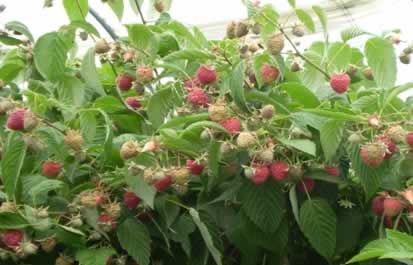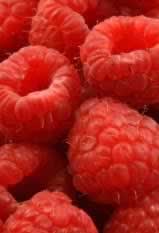Anti-inflammatory Benefits of Red Raspberry
The Journal of Agricultural and Food Chemistry, December 2011 has reported the anti-inflammatory effects of polyphenolic-enriched red raspberry extract in an antigen-induced arthritis in rate model. The red raspberry ( Rubus idaeus ) fruit contains bioactive polyphenols including anthocyanins and ellagitannins with reported anti-inflammatory properties. Red raspberry extract possess cartilage-protecting and anti-inflammatory benefits lowering the incidence and severity of arthritis compared to controlled subjects. The study suggests that red raspberry health benefits include inhibition of inflammation, pannus formation, cartilage damage, and bone resorption. http://www.ncbi.nlm.nih.gov/pubmed/22111586
Anti Cancer Benefits from Red Raspberry Extract
The Journal of Medicinal Food, March 2012 reported on the bioactive potential of red raspberry (Rubus idaeus L.) leaves in exhibiting cytotoxic and cytoprotective activity on human laryngeal carcinoma and colon adenocarcinoma. The Faculty of Food Technology and Biotechnology, University of Zagreb, Zagreb, Croatia, conducted the study on the bioactive potential of red raspberry leaves, its cytotoxic benefit, antioxidative/prooxidative effect, and effect on total glutathione concentration in human laryngeal carcinoma (HEp2) and colon adenocarcinoma (SW 480) cell lines. Results have shown that the two cell lines indicate cellular response that confirmed red raspberry biological activity that can provide effective health benefits.
http://www.ncbi.nlm.nih.gov/pubmed/22082102
Cardiovascular Benefits from Red Raspberry
Pharmacognosy Magazine. January 2011, reported the antihypertensive effect of ethyl acetate extract from red raspberry fruit in hypertensive rats. The study was done in the College of Public Health, Xinjiang Medical University, Urumqi, China. In the study, the red raspberry extracts demonstrated a dose-dependent antihypertensive effects in spontaneous hypertensive rats and this may be related to increased nitric oxide activation and improved vascular endothelial dysfunction via antioxidation. These results confirmed that raspberries rich in polyphenols have potential cardiovascular protective effects.
http://www.ncbi.nlm.nih.gov/pubmed/21472074
Liver Protective Benefits from Red Raspberry
Nutrition & Metabolism, November 2010 reported that fresh raspberry phytochemical extract can inhibit hepatic lesion in a Wistar rat model. The study investigated the protective effects of raspberry 80% acetone extract in a rat hepatic lesions model induced by diethylnitrosamine. Results have shown that a dose-dependent inhibition by red raspberry extract to diethylnitorsamine was observed. Increase of doses of red raspberry extract results to decreasing trend of proportions of hepatocellular carcinoma masses
The study suggests that red raspberry diet may provide health benefits for the suppression of hepatic lesions.
http://www.ncbi.nlm.nih.gov/pubmed/21108811
Skin Elasticity and Hair Growing Benefits of Red Raspberry Extract
Growth Hormone & IGF Research. August 2008 reported the benefits of topical application of raspberry ketone on hair growth and skin elasticity in humans. The study was done in Nagoya City University Graduate School of Medical Sciences, Nagoya, Japan. The study showed that red raspberry ketone extract when applied topically to the scalp and facial skin, 0.01% RK promoted hair growth in 50.0% of humans with alopecia at 5 months after application and increased cheek skin elasticity at 2 weeks after application in 5 females. These observations strongly suggest that red raspberry ketone might increase dermal IGF-I production through sensory neuron activation, thereby promoting hair growth and increasing skin elasticity.
http://www.ncbi.nlm.nih.gov/pubmed/18321745
Antibacterial Benefits from Red Raspberry
Prikl Biokhim Mikrobiol. November 2007 reported the antibacterial benefits of polyphenolic compounds isolated from plants of Geraniaceae and Rosaceae families. The study reported that the polyphenolic compounds present in extracts of plants belonging to the families Geraniaceae (blood-red cranesbill, wood cranesbill, meadow cranesbill, and alfilaria) and Rosaceae (red raspberry, European dewberry, and tormentil) have been tested for their activity against gram-positive and gram-negative bacteria of the genera Azotobacter, Bacillus, and Pseudomonas. The bacteriostatic activity of plant-derived phenolic compounds correlated with their antioxidant potential. The plants of the families Geraniaceae and Rosaceae offer possible health benefits as a source of raw material for isolation of polyphenolic compounds exhibiting bactericidal activity, including against opportunistic pathogens such as B. cereus, E. coli, P. aeruginosa, and S. aureus strains.
http://www.ncbi.nlm.nih.gov/pubmed/18173115
Antioxidant Benefits of Raspberry
The Journal, Biofactors, 2005 published a paper identifying the dietary relevance of antioxidants from raspberry. In this paper, the current literature on antioxidants from fruit of red raspberry (Rubus idaeus) were reviewed and placed these in context concerning what is known from other food species. The review concentrated on the methods of antioxidant testing, the diversity of antioxidants in raspberry, effects of ripeness, cultivar, storage and processing techniques, and the bioavailability of raspberry antioxidants in humans after eating the fruit. It is clear that raspberry, like several other fruits and vegetables such as tomato, strawberry, kiwi and broccoli, represents a valuable source of health benefitting compounds and can represent an important component of a balanced diet.
http://www.ncbi.nlm.nih.gov/pubmed/16498206
Anti-Obesity Benefits from Red Raspberry
The Medical Journal, Life Science. May 2005 reported the anti-obesity action of raspberry ketone. The study reported that the structure of red raspberry ketone is similar to the structures of capsaicin and synephrine, compounds known to exert anti-obese actions and alter the lipid metabolism. Like capsaicin and synephrine, red raspberry ketone helped prevent obesity and activate lipid metabolism in rodents by altering the lipid metabolism, or more specifically, in increasing norepinephrine-induced lipolysis in white adipocytes. The study suggests the further study for red raspberry ketone’s health benefits in weight loss program.
http://www.ncbi.nlm.nih.gov/pubmed/15862604

 Red raspberry (Rubus idaeus) is a perennial plant that is commonly found wild in Europe and Asia. Red raspberry is also cultivated for its fruit, eaten fresh, used in cakes and desserts or preserved as jam and jelly. Red raspberry is also used in traditional medicine for the many health benefits it gives.
Red raspberry (Rubus idaeus) is a perennial plant that is commonly found wild in Europe and Asia. Red raspberry is also cultivated for its fruit, eaten fresh, used in cakes and desserts or preserved as jam and jelly. Red raspberry is also used in traditional medicine for the many health benefits it gives.

